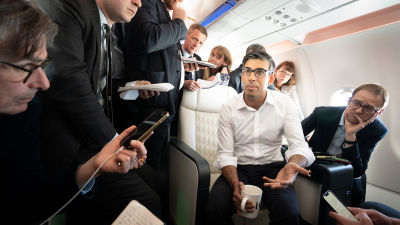PM backs away from manifesto pledge to cut immigration

The prime minister has signalled he is backing away from his party's manifesto pledge to lower net migration to the UK from its 2019 level of 226,000, before the general election.
Briefing journalists during a flight to the G7 summit of leading industrial nations, he would say only that he wanted to reduce legal migration and not that he would succeed in getting numbers below the target of 226,000.
Rishi Sunak was asked whether he is "committed to the quarter of a million figure", and replied: "I've inherited some numbers, I want to bring the numbers down."
When pressed further he said "I do want to bring legal migration down", but he made a distinction between "illegal migration" - which he described as "undoubtedly the country's priority" - and people coming to the UK legally under visa schemes.
Net migration to the UK hit an all-time record of 504,000 in the year to June 2022 - higher than it ever was before Brexit - and is thought still to be running at record levels.
Most of this immigration is authorised and legal, and reflects shortages of available workers throughout the UK, from agriculture, to social and healthcare, to IT, as well as the success of UK universities in attracting overseas students.
Sunak said he was "committed to bringing those numbers [of legal migrants] down", but did not specify a time scale, or an amount, and was explicit his priority is reducing the numbers coming across the channel in small boats and without prior permission through other routes.
His refusal to pledge to halve migration numbers from where they are now reflects a split in his Cabinet about the importance and deliverability of the manifesto pledge. There are fears of damage to important industries and public services if they are unable to recruit overseas workers.
Since Covid, well over 400,000 British workers have left the workforce because of ill health, and Brexit also led to chronic shortages of European Union (EU) workers in industries such as hospitality.
Chancellor Jeremy Hunt is especially concerned that any recovery in the UK economy would be held back if there is a policy decision to significantly reduce the numbers of work visas that are granted.
By contrast, Home Secretary Suella Braverman has been pressing for narrower and more onerous conditions on who can get a visa.
She wants new restrictions on the ability of students to bring family members to the UK and an increase in the minimum income that any visa applicant must earn from the current £26,200 per year for skilled workers.
The PM appears to be siding with the chancellor, having just announced that a scheme to allow 45,000 temporary visas for agriculture and horticulture will be extended for a further year.
Separately, the PM was upbeat about the recovery in the UK economy.
Want a quick and expert briefing on the biggest news stories? Listen to our latest podcasts to find out What You Need To Know...